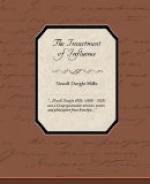Another strategic hour came in the thirteenth century. Then all Europe was stirred with new and awakening life. It was dawn after darkness. Constantinople had fallen and scholars laden with manuscripts went forth to sow Europe with the new learning. The times were fully ripe for another great forward movement for society. Only one thing was lacking—great men for leaders. In that strategic crisis six leaders appeared. God gave each wing of the army of civilization a genius for its general. Copernicus overthrew superstition and brought in science; Luther gave religion, Gutenberg the printing-press, Calvin individualism, Michael Angelo art and the beautiful, Erasmus critical scholarship; and because the old world was filled with debris, and the new ideas needed room, Columbus gave the new world, offering what Emerson calls “the last opportunity of Providence for the human race.” Surely this was a strategic moment in history, giving each citizen unique opportunity.
The strategic element enters into the individual career. Destiny is determined by our use of our critical hours. It is as if life’s great issues were staked upon a single throw. Not but that the forces we neglect are permanent. It is that the strategic condition has passed out of them. The sluggard driving his plow into the field in July has sun, soil and seed, but the torrid summer refuses to perform the gentle processes of April. The man who in youth’s strategic days denied to memory the great facts of nature and history, in maturer years still has his memory, but the plasticity has gone. It now refuses to hold the facts he gives it. The Latin poet interprets our principle by the story of the maiden in the boat, holding her hand in the water while she toyed with a string of pearls until the string snapped and the treasure sank into the abyss. The miner interprets opportunity lost through him who, for a rifle and a blanket, traded a rich copper mine that has since paid its owner millions. The historian interprets it by Napoleon’s bitter signal to his General, tardy at Waterloo, “Too late! the critical hour has passed.” Froude interprets it through the old hero bitterly condemning himself over his wife’s grave, knowing that his wild love and fierce outburst of affection were impotent now to warm the heart that froze to death in a home.




